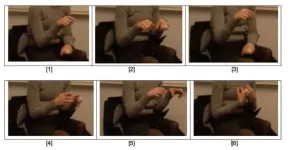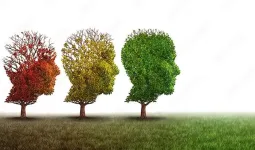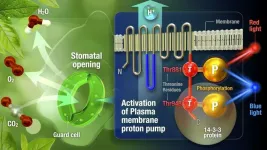(Press-News.org) One in three birders experiences accessibility challenges to participation in birding, according to Virginia Tech researchers Emily Sinkular and Ashley Dayer.
“I like to think of our research as blending together two previously unconnected fields: disability studies and wildlife recreation,” said Sinkular, a Ph.D. student and lead author of the study published March 26 in the journal Human Dimensions and Wildlife. “There’s been quite a lot of research on disability and lots of research on birding, but very few researchers have combined these two topics together.”
The researchers used a nationwide survey of U.S. wildlife viewers to compare the challenges and needs for birders with and without disabilities. Along with co-authors Freya McGregor, research associate in the Department of Fish and Wildlife Conservation, and Morgan Karns ’23, they analyzed open-ended responses using models of disabilities, or different frames of reference, to better understand how to talk about and think about disability so it resonates with disabled people.
Dayer’s Human Dimensions Lab has partnered with the U.S. Fish and Wildlife Service Multistate Conservation Grant Program to increase research on wildlife viewers with disabilities and to support state fish and wildlife agencies in learning how to better support these populations. Her lab specializes in enhancing conservation success through applying social science to effectively engage people and works to ensure that all voices are represented in research and conservation.
Dayer, an affiliated faculty member of Fralin Life Sciences Institute’s Global Change Center, said she hopes the work broadcasts a message of both inclusion and hope.
“My message for neurodiverse or disabled people: you are not alone in experiencing a desire to access nature and also facing additional challenges to doing so,” Dayer said. “And your challenges are increasingly being seen and addressed.”
“We suggest agencies and organizations reflect on how to make their programs more accessible and train staff or volunteers to do so as well,” said Dayer, associate professor in the Department of Fish and Wildlife Conservation. “Acknowledging that the responsibility to support participation of disabled birders rests on society and institutions, not on disabled people themselves, is essential.”
According to the Centers for Disease Control and Prevention, one in four Americans has a disability and that number is expected to rise with an aging population. Evidence further shows that people with disabilities are also historically underserved in wildlife-related recreation, including birding.
While the researchers found that birders with disabilities experienced more constraints than their peers, including lack of accessible features, safety concerns, and crowds at birding sites, commonalities in their needs for support of their recreational activity were also shown. Birders with and without disabilities expressed interest in access to more high-quality birding locations and information about where and when to view wildlife. This suggests strategies to improve wildlife viewing opportunities can benefit both groups.
“This shows us that agencies or organizations making changes to better include birders with disabilities can actually benefit everyone,” said Sinkular, who is also a student in the Department of Fish and Wildlife Conservation.
Ultimately, studying and planning for including people with disabilities in recreation will support broader social inclusion for this large population. The benefits of birding are multifaceted, including to mental well-being, social connections, and ultimately conservation actions. This research helps to bring these benefits to people with disabilities.
END
Virginia Tech study considers ways to increase accessibility for all wildlife enthusiasts
The study conducted by researchers in the College of Natural Resources and Environment focused on ways to include people with disabilities in wildlife-related recreation
2024-03-26
ELSE PRESS RELEASES FROM THIS DATE:
From autism to Alzheimer’s: A large-scale animal study links brain pH changes to wide-ranging cognitive issues
2024-03-26
A global collaborative research group comprising 131 researchers from 105 laboratories across seven countries announces a groundbreaking research paper submitted to eLife. Titled "Large-scale Animal Model Study Uncovers Altered Brain pH and Lactate Levels as a Transdiagnostic Endophenotype of Neuropsychiatric Disorders Involving Cognitive Impairment," the study identifies brain energy metabolism dysfunction leading to altered pH and lactate levels as common hallmarks in numerous animal models of neuropsychiatric and neurodegenerative disorders, such as intellectual disability, autism spectrum disorders, schizophrenia, bipolar disorder, depressive disorders, and Alzheimer’s ...
Tiniest ‘starquake’ ever detected – new study
2024-03-26
An orange dwarf star has yielded the tiniest ‘starquakes’ ever recorded, measured by an international team of scientists.
Named Epsilon Indi, the star is the smallest and coolest dwarf star yet observed with solar-like oscillations – “starquakes” like those shown by the Sun. These oscillations provide indirect glimpses of stellar interiors – just as earthquakes tell us about Earth's interior – and so are important sources of information about the makeup of the star.
The measurements ...
Italians’ and Swedes’ gestures vary when they tell stories, which may show cultures think differently about narratives
2024-03-26
When we talk, we often use our hands in addition to words. Gesturing is a phenomenon that has been observed across languages and cultures. Some cultures are typically thought to use more gestures than others.
To find out if the deeply rooted stereotype of Italians gesturing more than other cultures is true, researchers in Sweden have examined the differences in gesture rate and function between Italians and Swedes who were telling a story to a friend.
“We show that Italians do gesture more than Swedes, which was expected,” ...
New treatment target identified for Alzheimer's disease
2024-03-26
Researchers at the University of Leeds and Lancaster University in the UK have identified a new potential target for the treatment of Alzheimer’s disease – PDE4B.
Alzheimer's disease is the leading cause of dementia and disability in old age. As the number of people diagnosed with Alzheimer’s disease is on the increase, new treatments are urgently needed to improve the quality of life for people living with the disease.
PDE4B is an enzyme inside cells that breaks down a molecule known as cyclic AMP, which regulates a range of cellular processes. Based on an Australian study that identified the ...
Discovery of amino acid unveils how light makes plants open
2024-03-26
Scientists from Nagoya University have discovered a novel regulatory mechanism that controls the opening of stomata in plants, which is crucial for harnessing solar energy through photosynthesis. The team uncovered the role of phosphorylation at the 881st threonine residue (Thr881) of the plasma membrane proton pump in response to red and blue light in this process. This research opens up possibilities for manipulating plant physiology in specific ways, benefiting agriculture and the environment. The researchers reported their findings in Nature Communications.
“This phosphorylation event, ...
Crackdown on illicit drugs detects rise in ‘designer’ drug substitutes
2024-03-26
As authorities crack down on illicit drugs, University of South Australia experts have issued an alert on the use of the synthetic stimulant pentylone, as new research finds a 75% increase in detections across Australia.
In a new study as part of the Australian Criminal Intelligence Commission’s National Wastewater Drug Monitoring Program, researchers identified 20 different novel psychoactive substances (NPS) in wastewater treatment plants across Australia (between Feb 22-23) with pentylone detected at every collection site. Other NPS, eutylone and phenibut were also commonly detected.
Pentylone, (street name ‘bath salts’), ...
Treatment for blindness-causing retinal detachment using viscous seaweed
2024-03-26
It’s taboo to consume seaweed soup before exams in Korea since it can lead to failing the exam. The belief is rooted in the idea that the slippery nature of seaweed may cause people to slip and falter during the test. The slick surface of seaweeds such as seaweed and kelp is attributed to alginate, a mucilaginous substance. Notably, an intriguing study exploring the use of alginate for the treatment of retinal detachment has been recently published.
A collaborative effort between Professor Hyung Joon Cha from the Department of Chemical Engineering and the School of Convergence Science and Technology and Dr. Geunho Choi from ...
More needs to be done for depressed stroke survivors as incidence climbs
2024-03-26
Researchers say more needs to be done for depressed stroke survivors as new findings show 60% of stroke survivors would experience depression within 18 years, a much higher estimation than previous studies.
This compares to 22% of the general population experiencing depression in the same time frame.
The King’s College London study, published today in The Lancet Regional Health – Europe, also found 90% of cases of depression occurred within five years of surviving a stroke, indicating a key time for healthcare intervention.
The findings, funded by the National Institute for Health and Care Research, looks at incidence of mild ...
Research lights up process for turning CO2 into sustainable fuel
2024-03-26
Researchers have successfully transformed CO2 into methanol by shining sunlight on single atoms of copper deposited on a light-activated material, a discovery that paves the way for creating new green fuels.
An international team of researchers from the University of Nottingham's School of Chemistry, University of Birmingham, University of Queensland and University of Ulm have designed a material, made up of copper anchored on nanocrystalline carbon nitride. The copper atoms are nested ...
Essays on democracy draw attention to critical threats, explore safeguards ahead of Jan. 6
2024-03-25
Following the events of Jan. 6, 2021 — when a violent mob stormed the U.S. Capitol building in an effort to interrupt the certification process of the 2020 presidential election — experts began to question how to protect the next presidential election from a similar threat. To that end, University of Notre Dame political scientists have partnered with preeminent scholars of democracy from across the country to produce a set of recommendations to strengthen and safeguard democracy in America.
The University’s Rooney Center for the Study of American Democracy established the January 6th, ...
LAST 30 PRESS RELEASES:
ASU researchers to lead AAAS panel on water insecurity in the United States
ASU professor Anne Stone to present at AAAS Conference in Phoenix on ancient origins of modern disease
Proposals for exploring viruses and skin as the next experimental quantum frontiers share US$30,000 science award
ASU researchers showcase scalable tech solutions for older adults living alone with cognitive decline at AAAS 2026
Scientists identify smooth regional trends in fruit fly survival strategies
Antipathy toward snakes? Your parents likely talked you into that at an early age
Sylvester Cancer Tip Sheet for Feb. 2026
Online exposure to medical misinformation concentrated among older adults
Telehealth improves access to genetic services for adult survivors of childhood cancers
Outdated mortality benchmarks risk missing early signs of famine and delay recognizing mass starvation
Newly discovered bacterium converts carbon dioxide into chemicals using electricity
Flipping and reversing mini-proteins could improve disease treatment
Scientists reveal major hidden source of atmospheric nitrogen pollution in fragile lake basin
Biochar emerges as a powerful tool for soil carbon neutrality and climate mitigation
Tiny cell messengers show big promise for safer protein and gene delivery
AMS releases statement regarding the decision to rescind EPA’s 2009 Endangerment Finding
Parents’ alcohol and drug use influences their children’s consumption, research shows
Modular assembly of chiral nitrogen-bridged rings achieved by palladium-catalyzed diastereoselective and enantioselective cascade cyclization reactions
Promoting civic engagement
AMS Science Preview: Hurricane slowdown, school snow days
Deforestation in the Amazon raises the surface temperature by 3 °C during the dry season
Model more accurately maps the impact of frost on corn crops
How did humans develop sharp vision? Lab-grown retinas show likely answer
Sour grapes? Taste, experience of sour foods depends on individual consumer
At AAAS, professor Krystal Tsosie argues the future of science must be Indigenous-led
From the lab to the living room: Decoding Parkinson’s patients movements in the real world
Research advances in porous materials, as highlighted in the 2025 Nobel Prize in Chemistry
Sally C. Morton, executive vice president of ASU Knowledge Enterprise, presents a bold and practical framework for moving research from discovery to real-world impact
Biochemical parameters in patients with diabetic nephropathy versus individuals with diabetes alone, non-diabetic nephropathy, and healthy controls
Muscular strength and mortality in women ages 63 to 99
[Press-News.org] Virginia Tech study considers ways to increase accessibility for all wildlife enthusiastsThe study conducted by researchers in the College of Natural Resources and Environment focused on ways to include people with disabilities in wildlife-related recreation






